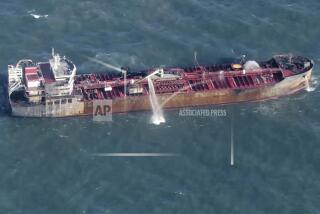Scuttle Single-Hull Tankers
- Share via
Large oil slicks that despoiled the once-pristine waters off the Spanish coast are now metastasizing into Portuguese and French territorial waters. The oil flows from 14 cracks in the tanker Prestige, which sank Nov. 19 and now rests on the ocean floor 130 miles from the fishing port of Vigo.
Its black cargo has tarred 180 beaches on Spain’s Atlantic coast, killing or maiming thousands of birds and ruining fish and shellfish harvests. Most economic activities have ceased in coastal towns and cities, and tens of thousands of people have lost their livelihoods.
Damage done, the European Commission has issued a blacklist that bans 66 specific ships from European waters and ports. The Spanish and French governments went a step further Dec. 12, barring single-hull tankers built more than 15 years ago from sailing within 200 miles of their coasts unless the vessels submit to exhaustive inspections.
The two nations’ bilateral decision marks a de facto acceleration of the phaseout of these dangerous ships, originally set for 2015 in legislation approved by the European Union last year.
This bold measure makes us wonder: What would it take to make the United States government follow suit?
The U.S. Oil Pollution Act of 1990 also defers until 2015 the phasing out of single-hull tankers. Yet new findings by U.S. environmental scientists have raised serious concerns that the long-term environmental effect of oil spills in the ocean may have been badly miscalculated. U.S. scientists had thought an ecosystem would return to normal in about 20 years. Three months ago, scientists from the Woods Hole Oceanographic Institution in Massachusetts announced they had found oil pockets just below the seabed in that state’s coast more than 30 years after a ship, the Florida, ran aground, spilling nearly 185,000 gallons of oil.
Not even bacteria have broken down the oil, says scientist Christopher Reddy. “It still looks like run-of-the-mill diesel fuel.”
Prevention is the only effective protection against a spill’s devastation. The best available cleanup technologies with properly trained personnel can recover only about 25% of an oil spill. The United States should follow the European example and accelerate its own phase-in of double hulls long before 2015.
More to Read
Sign up for Essential California
The most important California stories and recommendations in your inbox every morning.
You may occasionally receive promotional content from the Los Angeles Times.












